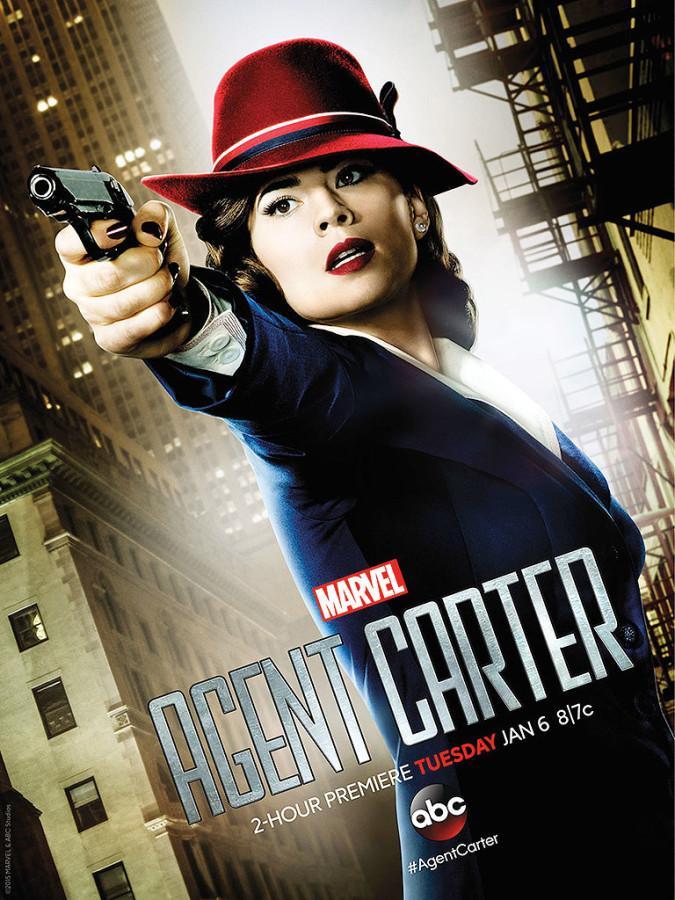There’s been a lot of talk about Marvel’s newest darling, “Agent Carter.” Some reviews have been good, while others not-so-good. Even with its limited release (it will air only eight episodes this winter) the show has already been the focus of fervent ratings analysis, skepticism, and comparison to its cousin “Agents of Shield” and glowing praise from all across the board. But amidst all the eye-narrowing about whether a female-led superhero show can succeed or not, “Agent Carter” has developed into a tightly plotted, entertaining addition to the comic book universe.
Set in 1946, following the events of “Captain America: The First Avenger,” the show follows Agent Peggy Carter (Hayley Atwell) as she continues with her life and career at the Strategic Scientific Reserve (SSR). Refreshingly, the show actively portrays the institutionalized sexism and misogyny that was (and still is) prevalent in our society during that time. Peggy, as the only woman working in an agency full of men, has been relegated to a veritable secretary, despite her commanding track record as a field agent. In the most recent episode, “The Iron Ceiling,” the lack of respect and outright sexism coworkers like Chief Dooley (Shea Whigham) and Agent Thompson (Chad Michael Murray) display towards her is seen slowly chipping away as she is finally given a field mission. Nevertheless, the show’s themes speak directly to the struggle Peggy faces as a woman in this society in conjunction with her struggle to follow in Steve Roger’s footsteps and becoming more or less a superhero.
The ratings issue is tricky, but an aspect that can either mean everything or nothing. Television networks rely on an outside company, Nielsen, to track viewing numbers and patterns (the system is inherently flawed, but that’s a discussion for a different day). In the case of “Agent Carter,” ratings have been slightly lower than expected. But the show is by no means a dud.Although the number of viewers has decreased slightly since the premiere (6.9 million from TV, 10 million including DVR watchers,) there is a very real issue in deriving qualitative value from any of those numbers. A lower 18-39 age demographic rating may simply be a sign of the times, with a decreasing number of younger TV viewers using traditional broadcasts to watch their shows. The logistical reasons for lower ratings could be endless, and the focus on whether 1 million viewers higher or lower would have made the show either a success or failure is, to be quiet honest, ludicrous.
What actually makes “Agent Carter” a success so far, is its continual willingness to integrate the idea of a female “super” hero and the very real-world struggles she might face, with the heightened, fantastical world of the comic book genre. Of course you want people to watch it, if only to prove how effective and entertaining a story centered on a female hero can be. But this show isn’t ephemeral; it will exist past each premiere date, something that ratings (as they are only concerned with ad revenue) don’t take into account. Whether 20 million or 1 million people watch each Tuesday night, the show has already overcome the limitations of television bureaucracy simply by being made and existing as a staple in Marvel’s cinematic universe for years to come.
Even though Peggy is taking a step forward for females in the visual media superhero world, and feels like a victory in many ways, there’s still a long way to go. Even with Peggy Carter, Carol Danvers (Captain Marvel) and Natasha Romanoff (Black Widow) gracing our screens, comic book movies are sorely lacking in representation of characters other than straight, white males. For all its progressive qualities, “Agent Carter” has a glaring hole in its cast for women of color and ignores, for the most part, the presence of racism during this time period.
There is a vocal and determined legion of fans who are demanding more representation in this genre and “Agent Carter” (and the “Captain Marvel” and “Black Panther” movies) are indications that they are being heard. Peggy isn’t a watered down “strong female character.” She is a leading character that is as vulnerable, distrustful, witty, caring, and totally badass (and not hyper-sexualized) as any male superhero, if not more so. But while “Agent Carter” might seem like a big step in the right direction, and it is, it doesn’t get us to the finish line. The inherent ideas of feminism are clearly present in “Agent Carter” but at its core feminism’s call for representation in the media is simply a call for more diverse, complex, and gender inclusive representation. As the industry and genre moves forward, there needs to be a focus on writing and producing stories that look at all the members of our society. This could mean following in the footsteps of other comics, for example, storylines about DC’s LGBTQ characters like Batwoman, Northstar, Scandal Savage and Pied Piper. It could also include stories about Ms. Marvel, Kamala Khan (a Muslim) portraying Loki as genderfluid, or it could mean coming up with new characters or new reboots. Either way, “Agent Carter” has been a long-awaited addition to the TV and superhero media climate and hopefully it’s just the beginning.

